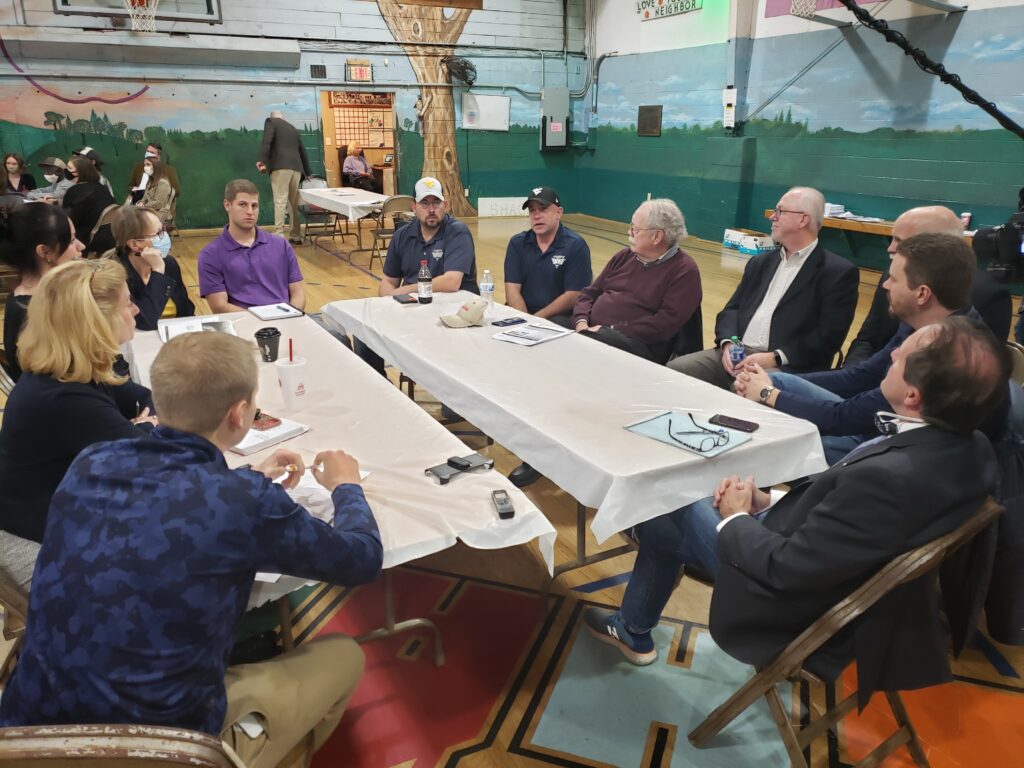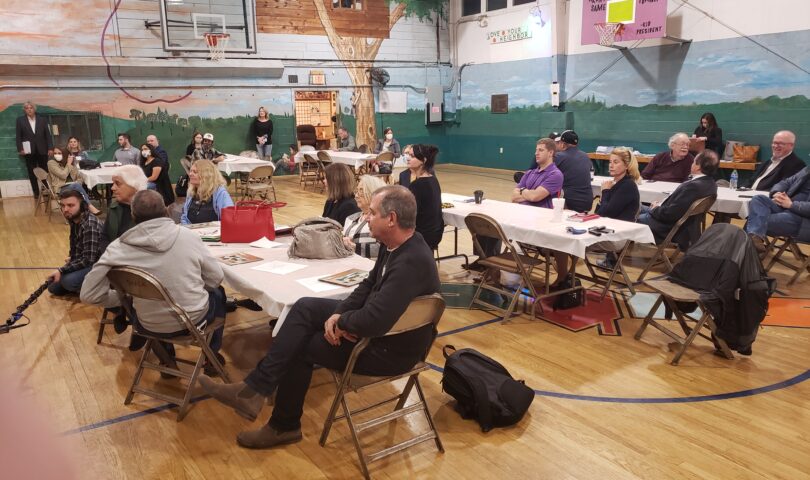MORGANTOWN – The House of Delegates Coal Communities Workgroup made a listening tour stop at the Shack Neighborhood House in Pursglove Wednesday evening to learn what the area needs to bounce back from coal’s decline.
“Coal communities across West Virginia have faced a lot of challenges over the decades, really, as jobs have been lost,” said Delegate Evan Hansen, D-Monongalia and a workgroup member.
The decline has sped up in recent years as various factors, including moving toward green energy, and affected production, he said. “The challenges of coal communities are real.”

The bipartisan group was formed earlier this year. It’s goal “is to go into communities and talk with local residents as well as local community and business leaders, to determine what our coal communities specifically need to succeed and what tools are already available.”
Federal funding is available, he said, and the group’s mission is to find out what to do with the funds and to write bills to develop new policies to fund initiatives and projects that will help.
Legislative Counsel Joe Altizer told the attendees that the federal Interagency Working Group on Coal and Power Plant Communities and Economic Revitalization has redirected $38 billion to designated coalfield communities across the U.S. to facilitate redevelopment; five of the 25 designated areas are in West Virginia. And the money is available at a 9-to-1 federal match.
All of Mon County’s House delegation, along with delegates from some adjacent counties; attended and helped facilitate the meeting. Attendees broke into groups around tables set up across the Shack’s gym floor and answered questions posed by the delegates leading the discussions.
The meeting stretched across two hours, and here are some highlights from a group led by Delegate John Williams, D-Monongalia.
The first part of the conversation focused on problems that need to be addressed.
County Commissioner Tom Bloom pointed out that there are no longer any active mines in Mon County – the last one closed earlier this year.
Williams noted a disconnect between the eastern and western ends of the county. “Sometimes the problems of western Monongalia County go unseen in Morgantown.”
Bloom said he’s often asked, “When are you going to bring a factory out to the western end” He was among those who noted that businesses are much inclined to locate 20 miles out a potholed two-lane road.
Mon County has WVU, many said, but not nearly enough available training for skilled trades jobs that pay living wages without a four-year degree.
Jason Todd is United Mine Workers rep, and worked underground until July. He’s 43 and if he wanted retraining, it would be problematic here. “So now I’ve got to go back to school at 43 years old and do a four-year college degree to even try to get a job.” He’d be 47 when he’s done.”Who’s going to hire me?”
County Commissioner Sean Sikora said Mon County is 71% white collar. “It’s good but I think we need to diversify the job base.”
Susan Riddle, president and CEO of the Visit Mountaineer Country Convention and Visitors Bureau, said, “ Tourism’s the up and coming opportunity.” But work needs to be done, specially regarding trail building.
The 15-county Mountaineer Trail Network is getting started, she said, working on planning and trying to identify five to eight trails that could be labeled, branded and promoted.
There’s a lack of cottage businesses along the trails, she said, to support the trail users: both the people who live in community and those who come here to use the trails.
The last part of the meeting was devoted to soliciting ideas the Legislature can take action on.
Riddle suggested funding infrastructure development to support tourism, including trail development. She doesn’t advocate shifting exisiting revenue that direction, but finding new sources.
Trina Wafle, with the WVU Energy Institute, said they need to find state matching funds to support cost share requirements for the federal funds.
Sikora said the Legislature needs to enable development of better economic incentive packages to put West Virginia on a better footing against other states when businesses are seeking to expand or relocate.
WVU geologist Tim Carr, project director of the Marcellus Shale Energy and Environment Laboratory, was among those who talked about keeping fossil fuels relevant through advanced technologies such as carbon fiber production and carbon capture and sequestration, and the potential of geothermal energy.
For those, things, he said, the Legislative needs to pin down some basic issues other states have addressed: who owns the underground pores where carbon will stored, and who owns the geothermal heat?
He doesn’t care what the Legislature decides, he said, but the owners need to be identified so all the money doesn’t go to the lawyers litigating the disputes.
Hansen said that all the information gathered Wednesday and at the other listening tour stops will be assembled, reviewed and shared with the public at a later date.
TWEET David Beard @dbeardtdp EMAIL dbeard@dominionpost.com




